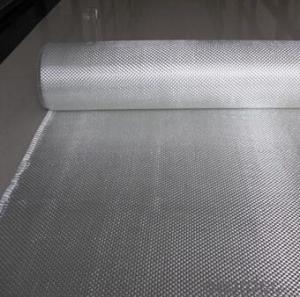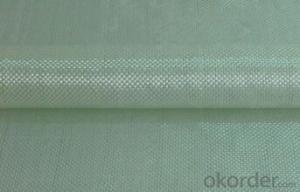C-Glass Woven Roving, 500g, 1m
- Loading Port:
- China Main Port
- Payment Terms:
- TT or LC
- Min Order Qty:
- -
- Supply Capability:
- -
OKorder Service Pledge
OKorder Financial Service
You Might Also Like
Structure of woven roving Description
Glass woven rovings are bidirectional fabric by direct rovings in plain weave pattern. They are applicable for hand lay-up, winding and compress molding process, suitable for manufacturing tank, boat, automobile parts and other FRP products.
1,high strenth,corosion and resistence
2,consistent thickness,no fuzz
3,rapid impregnating
Main Features of the woven roving
1)Drapes well to suit the surface of intricate moulds
2)Fast wet-through and wet out
3)Easy handing and better appearance of the composite parts
4)Compatible with Unsaturated polyester resin
5)Very high laminate strength properties
Woven roving Images
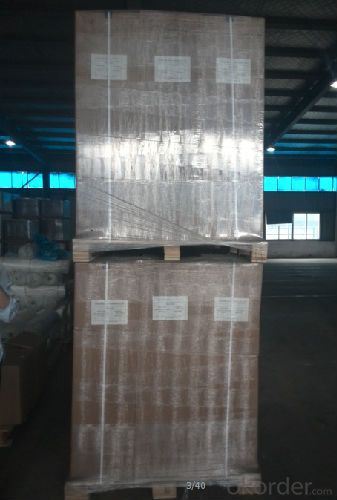
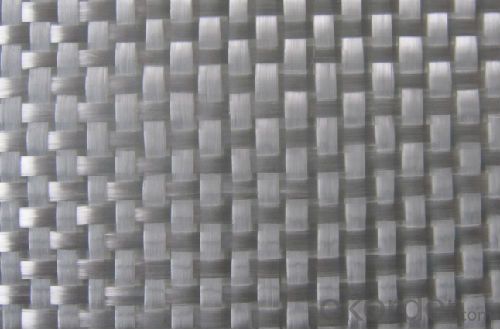
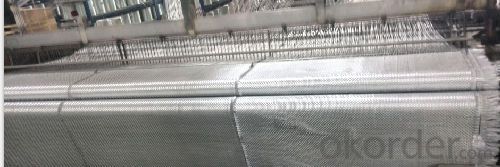
Woven roving Specification:
Normal type | EWR800 | EWR400 | EWR300 | EWR500 | EWR600 |
Thickness (mm) | 0.8 | 0.4 | 0.3 | 0.5 | 0.6 |
Density(warpxweft) (end/cm) | 1.8x1.5+/-10% | 3.6x3.2+/-10% | 4.6x4.1+/-10% | 2.2X2.0+/-10% | 2.6X2.4+/-10% |
Tex (warpxweft) | 2400x2400 | 600X600 | 300x400 | 1200x1200 | 1200X1200 |
Moisture content(%) | <0.2% | <0.2% | <0.2% | <0.2% | <0.2% |
Loss on ignition(%) | 0.4 – 0.8 | 0.4-0.8 | 0.4-0.8 | 0.4-08 | 0.4-0.8 |
Width(cm) | 125+/-1 | 125+/-1 | 125+/-1 | 125+/-1 | 125+/-1 |
Weight (g/m2) | 816+/-41 | 408+/-32 | 300+/-15 | 500+/-25 | 600+/-30 |
Weight per roll(kg) | 45 | 46 | 50 | 45 | 45 |
Glass | E-glass | E-glass | E-glass | E-glass | E-glass |
FAQ of woven roving:
Delivery Detail: 15-21days
Other spec. can be custom made as per customer's request.
Application of Fiberglass Woven Roving:
a) boats ,vessels ,plane
b) automotive parts ,furniture and sports facilities
c) resins system,such as polyeser,vinylester and epoxy resins
- Q:Is fiberglass mat tissue resistant to oil and grease?
- Yes, fiberglass mat tissue is resistant to oil and grease.
- Q:Can fiberglass mat tissue be used for insulation?
- Yes, fiberglass mat tissue can be used for insulation. It is commonly used in the construction industry as a thermal and sound insulation material. The fiberglass mat tissue is made up of fine fibers of glass that are woven into a mat-like structure. This structure traps air and creates a barrier that helps to reduce heat transfer, keeping the desired area insulated and maintaining a comfortable temperature. Additionally, fiberglass mat tissue is also resistant to moisture, fire, and pests, making it a suitable choice for insulation in various applications.
- Q:How is fiberglass mat tissue used in the aerospace industry?
- Fiberglass mat tissue is used in the aerospace industry primarily for its lightweight and high strength properties. It is commonly used as a reinforcement material in the manufacturing of aircraft components such as wings, fuselage, and tail structures. The fiberglass mat tissue provides structural integrity and enhances the overall durability of these components, while also offering excellent resistance to corrosion and high temperatures.
- Q:What are the main applications of fiberglass mat tissue?
- Fiberglass mat tissue is a versatile material that finds various applications in industries such as construction, automotive, aerospace, and marine. Some of the main applications of fiberglass mat tissue include: 1. Construction: Fiberglass mat tissue is commonly used in the construction industry for reinforcing and strengthening various building materials such as roofing shingles, wallboards, and cementitious products. It adds tensile strength and durability to the structures, making them more resistant to cracks, water damage, and weathering. 2. Automotive: Fiberglass mat tissue is used in the manufacturing of automotive parts such as dashboards, door panels, and trunk liners. It provides structural integrity, sound insulation, and heat resistance, making the vehicles safer and more comfortable. 3. Aerospace: In the aerospace industry, fiberglass mat tissue is used in the production of lightweight composite materials used in aircraft structures. It helps in reducing the overall weight of the aircraft, improving fuel efficiency, and enhancing its performance. 4. Marine: Fiberglass mat tissue is widely used in boat and shipbuilding. It is used in the construction of hulls, decks, and other components to provide strength, stiffness, and resistance to water and corrosion. Fiberglass mat tissue is preferred over traditional materials like wood due to its lightweight, durability, and low maintenance requirements. 5. Electrical and Electronics: Fiberglass mat tissue is used in electrical insulation applications such as transformer boards, electrical cabinets, and switchgear. It provides excellent dielectric properties, heat resistance, and mechanical strength, ensuring the safety and reliability of electrical equipment. 6. Filtration: Fiberglass mat tissue is used in various filtration applications such as air filters, water filters, and oil filters. It acts as a filtration media, trapping and removing impurities, dust, and particles from the air, water, or oil, thus improving the quality and purity of the filtered substances. Overall, fiberglass mat tissue is a widely used material in numerous industries due to its strength, durability, lightweight, and resistance to various environmental factors. Its versatility makes it an essential component in various applications, contributing to the development of safer, stronger, and more efficient products.
- Q:Is fiberglass mat tissue suitable for insulation in cold storage facilities?
- Cold storage facilities can benefit from the use of fiberglass mat tissue as an insulation material. Fiberglass possesses remarkable thermal insulation properties, effectively blocking heat transfer and maintaining low temperatures in the storage area. Moreover, fiberglass is moisture-resistant and does not absorb water, making it ideal for environments prone to condensation and moisture. The installation of fiberglass mat tissue is simple and offers a cost-effective solution for insulating the walls, ceilings, and floors of cold storage facilities. Ultimately, the use of fiberglass mat tissue plays a vital role in preserving the desired cold temperatures and preventing any thermal leaks in these facilities.
- Q:What are the different types of fiberglass mat tissue available?
- There are various types of fiberglass mat tissue available, including chopped strand mat (CSM), continuous filament mat (CFM), and surface veil mat. Each type has different characteristics and is used for specific applications in industries such as construction, automotive, and marine. CSM is commonly used for general purpose applications, CFM provides higher strength and stiffness, and surface veil mat is used for surface finishing and improving the aesthetics of fiberglass products.
- Q:Is fiberglass mat tissue suitable for construction applications?
- Yes, fiberglass mat tissue is suitable for construction applications. It is commonly used as a reinforcement material in various construction projects due to its high strength, durability, and resistance to corrosion. It provides added structural integrity and stability to buildings, bridges, and other infrastructure. Additionally, fiberglass mat tissue is lightweight and easy to handle, making it a convenient choice for construction applications.
- Q:How does fiberglass mat tissue compare to fiberglass insulation batts?
- Fiberglass mat tissue and fiberglass insulation batts differ in their composition, purpose, and usage. Fiberglass mat tissue, also known as fiberglass veil or fiberglass veil mat, is a thin, non-woven fabric made from fine glass fibers. It is primarily used as a reinforcement material in composites, such as roofing materials, laminates, and automotive parts. The main purpose of fiberglass mat tissue is to add strength, durability, and resistance to cracking or tearing to the final product. It is commonly used in applications where high tensile strength and dimensional stability are required. On the other hand, fiberglass insulation batts are thick, flexible panels made from compressed fiberglass fibers. They are designed specifically for thermal insulation purposes, typically used in residential and commercial buildings. The primary function of fiberglass insulation batts is to create a thermal barrier, reducing heat transfer and improving energy efficiency. They are commonly installed in walls, attics, or crawl spaces to minimize heat loss or gain, providing better temperature control and reducing energy costs. When comparing fiberglass mat tissue to fiberglass insulation batts, it is important to note their distinct purposes and applications. Fiberglass mat tissue is not designed for thermal insulation and should not be used as a substitute for insulation batts. Conversely, fiberglass insulation batts are not suitable as a reinforcement material in composites. In terms of construction and installation, fiberglass mat tissue is typically used in conjunction with other materials, such as resins or adhesives, to form a composite structure. It can be easily cut, shaped, and molded to fit various shapes and sizes. On the other hand, fiberglass insulation batts are available in pre-cut sizes and are relatively easy to install by fitting them between framing studs or joists. Both fiberglass mat tissue and fiberglass insulation batts have their respective advantages and disadvantages, depending on the specific requirements of the project. While fiberglass mat tissue offers superior strength and dimensional stability for composites, fiberglass insulation batts excel in providing thermal insulation for buildings. Ultimately, the choice between the two will depend on the intended application and desired outcome.
- Q:Can fiberglass mat tissue be used for insulation in shopping malls?
- Indeed, insulation in shopping malls can incorporate the utilization of fiberglass mat tissue. This material is widely employed and proven to be efficient for thermal insulation owing to its low thermal conductivity and exceptional resistance to heat transfer. Moreover, fiberglass mat tissue possesses the advantage of being non-combustible, rendering it a secure choice for commercial structures such as shopping malls. Furthermore, its lightweight nature facilitates effortless installation, and its superb sound absorption properties contribute to establishing a pleasant and serene ambiance in the mall. All in all, fiberglass mat tissue emerges as an appropriate selection for insulation in shopping malls, ensuring energy efficiency and enhanced indoor comfort.
- Q:Is fiberglass mat tissue suitable for automotive applications?
- Fiberglass mat tissue is indeed suitable for automotive applications. This versatile material offers numerous benefits when utilized in the automotive industry. It boasts excellent strength and durability, crucial qualities for automotive parts that must endure harsh conditions and heavy use. Moreover, fiberglass mat tissue possesses commendable thermal and electrical insulation properties, making it ideal for applications that require resistance to temperature and electrical currents. Furthermore, the lightweight nature of fiberglass mat tissue can contribute to enhanced fuel efficiency and overall vehicle performance. It is also highly malleable, enabling manufacturers to craft intricate automotive parts with precision. Additionally, this material resists corrosion, chemicals, and UV radiation, ensuring that automotive components remain reliable and long-lasting. In summary, the exceptional qualities of fiberglass mat tissue make it an optimal choice for various automotive applications, such as body panels, interior components, structural reinforcements, and sound insulation. Its strength, durability, insulation properties, lightweight nature, and resistance to corrosion and chemicals make it a dependable and cost-effective material for the automotive industry.
1. Manufacturer Overview |
|
|---|---|
| Location | |
| Year Established | |
| Annual Output Value | |
| Main Markets | |
| Company Certifications | |
2. Manufacturer Certificates |
|
|---|---|
| a) Certification Name | |
| Range | |
| Reference | |
| Validity Period | |
3. Manufacturer Capability |
|
|---|---|
| a)Trade Capacity | |
| Nearest Port | |
| Export Percentage | |
| No.of Employees in Trade Department | |
| Language Spoken: | |
| b)Factory Information | |
| Factory Size: | |
| No. of Production Lines | |
| Contract Manufacturing | |
| Product Price Range | |
Send your message to us
C-Glass Woven Roving, 500g, 1m
- Loading Port:
- China Main Port
- Payment Terms:
- TT or LC
- Min Order Qty:
- -
- Supply Capability:
- -
OKorder Service Pledge
OKorder Financial Service
Similar products
New products
Hot products
Related keywords
